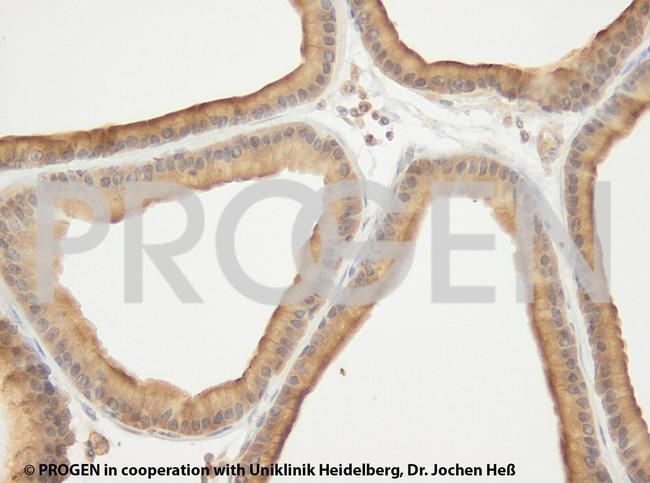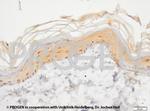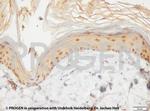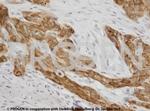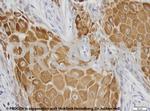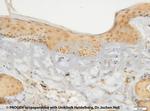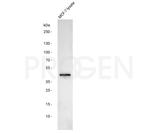Search Thermo Fisher Scientific
Product Details
61036
Species Reactivity
Host/Isotype
Class
Type
Clone
Immunogen
Conjugate
Form
Concentration
Purification
Storage buffer
Contains
Storage conditions
Shipping conditions
Product Specific Information
Reconstitute lyophilized product with 1 mL distilled water.
Ks 17.E3 represents an excellent marker to distinguish myoepithelial cells (positive for K17) from luminal epithelium of various glands (mammary, sweat, salivary, bronchial, tracheal, laryngeal, esophageal) and benign from malignant forms of e.g. mammary gland tumors. In the epidermis suprabasal staining is found only in cornifying regions and in the outer root sheath of hair follicles.Tested reactivity on cultured cell lines: HeLa, A-431Tumors specifically detected: Benign tumors of mammary gland; most malignant forms of mammary tumors are negative for keratin K17.
Target Information
Cytokeratins are a subfamily of intermediate filament proteins and are characterized by a remarkable biochemical diversity, represented in human epithelial tissues by at least 20 different polypeptides. They range in molecular weight between approximately40 kDa and approximately68 kDa and isoelectric pH between 4. 9 - 7. 8. The individual human cytokeratins are numbered 1 to 20. The various epithelia in the human body usually express cytokeratins which are not only characteristic of the type of epithelium, but also related to the degree of maturation or differentiation within an epithelium. Cytokeratin subtype expression patterns are used to an increasing extent in the distinction of different types of epithelial malignancies. The cytokeratin antibodies are not only of assistance in the differential diagnosis of tumors using immunohistochemistry on tissue sections, but are also a useful tool in cytopathology and flow cytometric assays.
For Research Use Only. Not for use in diagnostic procedures. Not for resale without express authorization.
References (0)
Bioinformatics
Protein Aliases: 39.1; CK-17; CK17; Cytokeratin-17; hard keratin; K17; keratin 17, type I; Keratin, type I cytoskeletal 17; Keratin-17; krt17 {ECO:0000250|UniProtKB:Q04695}; Type I keratin Ka17
Gene Aliases: 39.1; CK-17; K17; Ka17; KRT17; PC; PC2; PCHC1
UniProt ID: (Human) Q04695, (Rat) Q6IFU8
Entrez Gene ID: (Human) 3872, (Rat) 287702

Performance Guarantee
If an Invitrogen™ antibody doesn't perform as described on our website or datasheet,we'll replace the product at no cost to you, or provide you with a credit for a future purchase.*
Learn more
We're here to help
Get expert recommendations for common problems or connect directly with an on staff expert for technical assistance related to applications, equipment and general product use.
Contact tech support
